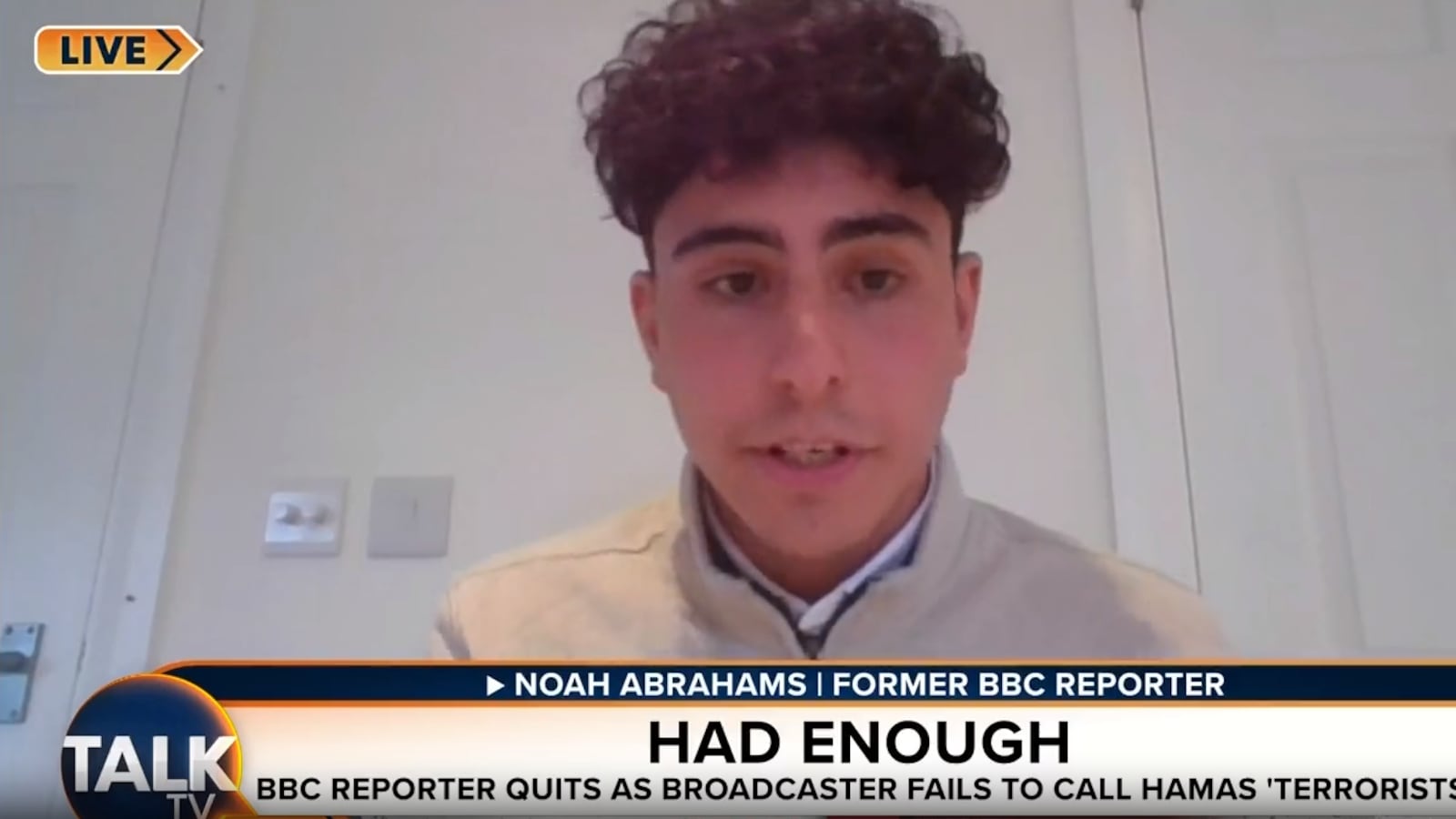A Jewish sports reporter for the BBC announced this week that he would no longer work for the British news organization due to its refusal to describe Hamas militants as “terrorists,” calling his ex-employer’s decision “unjustified.”
A BBC spokesperson, however, told The Daily Beast that the reporter in question was actually a freelancer who didn’t “have any future work lined up with the BBC,” so it would be incorrect to say he “quit” or “resigned” from the network.
Amid the rising tensions and bloodshed following Hamas’ horrific attack on Israel, sparking war and a geopolitical crisis, the BBC defended not labeling members of the Gaza-based group as “terrorists,” citing a long-standing policy of impartiality.
Noah Abrahams, a 22-year-old freelance commentator for BBC Derby Radio, took to social media on Wednesday to condemn the broadcaster’s defense of its policy and resign in protest.
“A personal announcement from me: I will no longer work for or represent the BBC,” he posted on X, the social media platform previously known as Twitter. “No more games this season. No more input.”
Abrahams later appeared on the right-leaning U.K. television channel TalkTV on Thursday to discuss his decision to distance himself from the vaunted news outlet.
“I have morals and I stick by them. I think the BBC’s refusal to use the correct terminology is unjustified,” Abrahams told TalkTV host Peter Cardwell. “Words impact how we think, how we react, how we act. They have influence.”
He added: “There are probably people watching who think I’ve thrown it all away for some words, but words—when neglected—have the power to fuel hate and put fuel on the fire.”
Calling it a “monumental career life decision,” Abrahams expressed concerns over the threats Jewish people face in light of the attacks, especially as Hamas called for a global “Day of Rage” on Friday in response to its war with Israel.
“Like many in the Jewish community, I don’t see myself as exceptional,” he stated. “The fear is real among British Jews, including myself, and this has led me to a significant turning point in both my career and life.”
Abrahams continued: “I hold strong to my values. I’ve observed the terms ‘justified’ and ‘unjustified’ being used frequently lately. In my view, the BBC’s decision to avoid the appropriate wording is unjustifiable.”
The young reporter also took issue with BBC World Affairs Editor John Simpson defending the broadcaster’s policy in an op-ed this week. “[Hamas] aren’t freedom fighters or, as John Simpson refers to them, gunmen. They’re terrorists,” Abrahams declared.
“Government ministers, newspaper columnists, ordinary people—they’re all asking why the BBC doesn’t say the Hamas gunmen who carried out appalling atrocities in southern Israel are terrorists,” Simpson wrote this week. “The answer goes right back to the BBC’s founding principles.”
“Terrorism is a loaded word, which people use about an outfit they disapprove of morally. It’s simply not the BBC’s job to tell people who to support and who to condemn—who are the good guys and who are the bad guys,” the journalist continued in his op-ed. “We regularly point out that the British and other governments have condemned Hamas as a terrorist organisation, but that’s their business. We also run interviews with guests and quote contributors who describe Hamas as terrorists.”
He added: “The key point is that we don’t say it in our voice. Our business is to present our audiences with the facts, and let them make up their own minds.”
A BBC spokesperson, meanwhile, told The Daily Beast that “we always take our use of language very seriously”, adding that “anyone watching or listening to our coverage will hear the word ‘terrorist’ used many times – we attribute it to those who are using it, for example, the UK Government.”
The spokesperson continued: “This is an approach that has been used for decades, and is in line with that of other broadcasters. The BBC is an editorially independent broadcaster whose job is to explain precisely what is happening ‘on the ground’ so our audiences can make their own judgement.”
The broadcaster, meanwhile, continues to face backlash over its unwillingness to have its anchors and hosts not use the word “terrorist.” Protesters papered the network’s headquarters on Thursday with photos of missing Israeli citizens, while U.K. Defense Secretary Grant Shapps called the BBC’s policy “disgraceful.”






